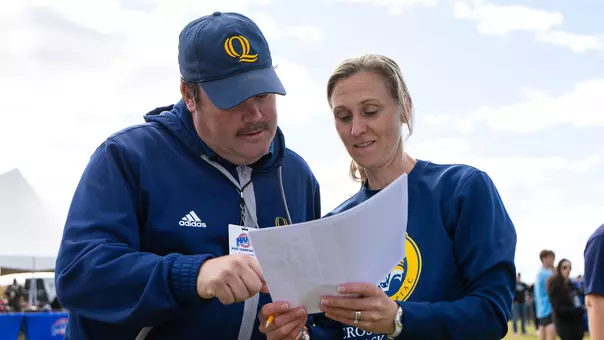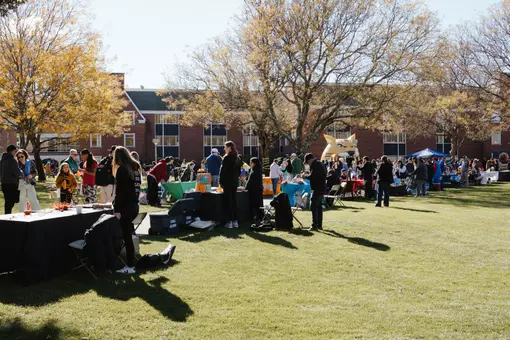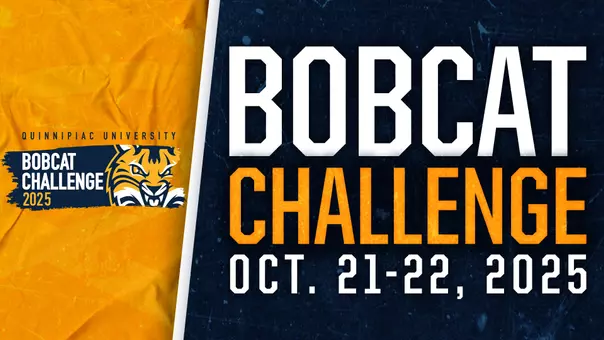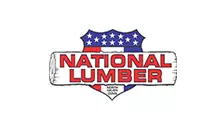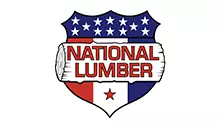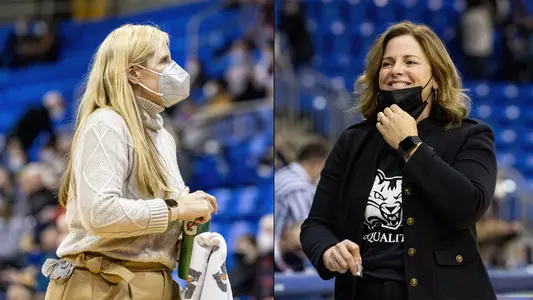
From Minority to Majority: The Growth of Female Athletic Training Through the Lens of Title IX
1/31/2023 12:00:00 AM | General
Written by Tyrell Walden-Martin
HAMDEN, Conn. – Not everyone is able to find their hero within their chosen profession.
But for Quinnipiac Athletics Associate Athletic Trainer Becky Mella – she found someone to look up to.
"Sue Falsone is the first female athletic trainer to work for an American professional sports team, and she is without a doubt my hero," Mella said. "She taught me dry needling… she is the woman! She is so smart, an amazing teacher and is very well respected in the world of athletics and medicine."
Falsone broke barriers within the world of athletics, as she holds the distinction of being the first female head athletic trainer in any of the four major sports in the United States (MLB, NFL, NHL, NBA). She's also served as Head of Athletic Training and Sport Performance with the US Soccer's Men's National Team.
 "She teaches, has her own company and works as a consultant regarding all of the professional stops she has worked for, including the Dodgers, USA Soccer and many others," Mella added. "She broke the mold and she really made changes in the field for women in athletic training."
"She teaches, has her own company and works as a consultant regarding all of the professional stops she has worked for, including the Dodgers, USA Soccer and many others," Mella added. "She broke the mold and she really made changes in the field for women in athletic training."
Upon taking Falsone's advanced dry needling class with fellow Quinnipiac Athletics Associate Athletic Trainer Sara MacDonough-Civitello, it was Falsone's way of teaching that left Mella with thoughts of going down a similar career path.
"As I was taking her second course, I kept thinking that she was so good at explaining things and helping the activity make sense," Mella stated. "As a professional we all should try to improve, and to me she's an inspiration. That's what I want to be like. I want to teach students and young professionals."
Mella found her way to Falsone by wanting to continue her growth in the field of athletic training, something that was once very difficult for women to do in her field.
Once upon a time, NATA could be looked at as a "men's club". Despite its creation in 1950, NATA didn't see its first female certified athletic trainer until Kaye Cosby in 1972, the same year that Title IX was put into place. In 1974, 24 years after its inception, just 1% of NATA members were female.
"When I was deciding on what I wanted to do with my life as a junior or senior in high school, the only thing I knew that was available to me was physical therapy because I had never seen a female athletic trainer," Sara MacDonough-Civitello said. "When I went to college and found this athletic training program, there were no females working in the profession. We had females in the curriculum and taking the classes together, but I hadn't seen anyone (female) in the role that I wanted until I went to graduate school at East Stroudsburg University."
For MacDonough-Civitello, it took stumbling upon a photograph to realize just how far women in sports had grown over one generation.
"I remember looking at a picture of my mom from high school taking a layup, and I asked her why she didn't play on the team."
"We didn't have a team," her mother responded.
"Damn, I played four sports in high school and two in college. I am never going to give this up, I don't want to give this up," MacDonough-Civitello thought to herself.
Despite the lack of immediate female athletic trainer figures for MacDonough-Civitello, she remained inspired and passionate about athletic training as a student. So much so that she attended an unaccredited athletic training program so she could play sports at Johnson State College, now known as Northern Vermont State University.
"It used to be you could not do both and be an athletic training student," MacDonough-Civitello said. "But they allowed you to be a well-rounded student and I knew I needed that to stay happy, be well-rounded and to continue my studies in athletic training. I didn't want to give up my Div. III training career."
"For me I was always told you can do it all, and that's a curse that comes from our generation," MacDonough-Civitello added. "Knowing that you can do it all. So now we are constantly looking for that next thing. For me I knew it was athletic training. I never wavered, I never changed my major, there was nothing else I wanted. As soon as I understood what athletic training was… that was it."
On July 24th, 2002, the Pittsburgh Steelers became the first NFL team to hire a full-time female athletic trainer. Ariko Iso was hired as an assistant athletic trainer by the Steelers after interning for their training camps in 2000 and 2001.
Later that fall, MacDonough-Civitello spotted her on the sidelines and it resulted in the start of her athletic training career with football.
"This pretty cool," MacDonough-Civitello thought to herself.
"I loved football… most of my internship hours were in football. It was so fast-paced, there was so much to do and so much to learn and I felt like I could hold my own there. I was awarded a few cool opportunities as a result."
"It was all-encompassing," MacDonough-Civitello added. "I still got to be on the sidelines for games, I still got to see the small moments and victories of our athletes. Whether its wins or losses on the field, I had a different view of what a victory could be in athletic training. You might treat that injury from the very start and then see it through surgery, then a return to the field and an athlete's success."
Mella found her start in athletic training through playing sports, as well, as she played soccer at Ithica College. Legislature like Title IX afforded Mella and other women the opportunity to participate in sports, and opened other career avenues for them as well.
"I think it is a result of Title IX because there were more women in sports, but, more importantly, women were also breaking barriers in their career fields," Mella said. "We want to work in those fields. We will play high school sports and we will see our athletic trainer and see that profession and think, 'Oh that's cool, I can do that someday.'"
"That is how we usually get our students, they have a positive experience with their high school athletic trainer and want to do that," Mella continued. "A lot of them are athletes, so having more female athletes transferred in to having more females in our field."
And the numbers have shown just that. Currently, according to the NATA website (nata.org), there are 45,000 total NATA members and 55% of them are females.
MacDonough-Civitello believes this – in part – can be attributed to Title IX.
"I think that NATA and Title IX worked together, they had to go hand-in-hand," MacDonough-Civitello noted. "We needed women's sports to be taken seriously and to have opportunities for women's sports, and as a result, they also needed women to support those programs. Whether it was strength and conditioning, or athletic training, or with coaches, I would like to think that they evolved together and it took some of that legislation and organization for it to be taken seriously."
"Now, many of our (athletic training) classes have more women than men… it has been embraced," MacDonough-Civitello added. "We see women in the (NATA) Hall of Fame, they have put in mentor programs such as AT Cares, where we are putting women in positions of power. They (NATA) have had a female president. It's something I take for granted because I am standing on the shoulders of giants."
And at the end of it all, it comes back to the legislative bill that was passed on June 23rd, 1972, just over 50 years ago. The landmark law that removed barriers and expanded the opportunities for women and girls in sports forever.
"The biggest thing for me is seeing how far women's sports has come. Every support role within that has exploded simply because Title IX came to be," MacDonough-Civitello said.
"The people that I have been exposed to and the female leaders I have been able to work around are here because of Title IX," Mella added. "Women like Sue Falsone, Quinnipiac coach Tricia Fabbri and some of my coworkers today. I was an athlete and it led me to athletic training. Sports is that part of life that teaches you lots of things, having that available because of Title IX has truly changed the landscape of things."
But for Quinnipiac Athletics Associate Athletic Trainer Becky Mella – she found someone to look up to.
"Sue Falsone is the first female athletic trainer to work for an American professional sports team, and she is without a doubt my hero," Mella said. "She taught me dry needling… she is the woman! She is so smart, an amazing teacher and is very well respected in the world of athletics and medicine."
Falsone broke barriers within the world of athletics, as she holds the distinction of being the first female head athletic trainer in any of the four major sports in the United States (MLB, NFL, NHL, NBA). She's also served as Head of Athletic Training and Sport Performance with the US Soccer's Men's National Team.
 "She teaches, has her own company and works as a consultant regarding all of the professional stops she has worked for, including the Dodgers, USA Soccer and many others," Mella added. "She broke the mold and she really made changes in the field for women in athletic training."
"She teaches, has her own company and works as a consultant regarding all of the professional stops she has worked for, including the Dodgers, USA Soccer and many others," Mella added. "She broke the mold and she really made changes in the field for women in athletic training."Upon taking Falsone's advanced dry needling class with fellow Quinnipiac Athletics Associate Athletic Trainer Sara MacDonough-Civitello, it was Falsone's way of teaching that left Mella with thoughts of going down a similar career path.
"As I was taking her second course, I kept thinking that she was so good at explaining things and helping the activity make sense," Mella stated. "As a professional we all should try to improve, and to me she's an inspiration. That's what I want to be like. I want to teach students and young professionals."
Mella found her way to Falsone by wanting to continue her growth in the field of athletic training, something that was once very difficult for women to do in her field.
Once upon a time, NATA could be looked at as a "men's club". Despite its creation in 1950, NATA didn't see its first female certified athletic trainer until Kaye Cosby in 1972, the same year that Title IX was put into place. In 1974, 24 years after its inception, just 1% of NATA members were female.
"When I was deciding on what I wanted to do with my life as a junior or senior in high school, the only thing I knew that was available to me was physical therapy because I had never seen a female athletic trainer," Sara MacDonough-Civitello said. "When I went to college and found this athletic training program, there were no females working in the profession. We had females in the curriculum and taking the classes together, but I hadn't seen anyone (female) in the role that I wanted until I went to graduate school at East Stroudsburg University."
For MacDonough-Civitello, it took stumbling upon a photograph to realize just how far women in sports had grown over one generation.
"I remember looking at a picture of my mom from high school taking a layup, and I asked her why she didn't play on the team."
"We didn't have a team," her mother responded.
"Damn, I played four sports in high school and two in college. I am never going to give this up, I don't want to give this up," MacDonough-Civitello thought to herself.
Despite the lack of immediate female athletic trainer figures for MacDonough-Civitello, she remained inspired and passionate about athletic training as a student. So much so that she attended an unaccredited athletic training program so she could play sports at Johnson State College, now known as Northern Vermont State University.
"It used to be you could not do both and be an athletic training student," MacDonough-Civitello said. "But they allowed you to be a well-rounded student and I knew I needed that to stay happy, be well-rounded and to continue my studies in athletic training. I didn't want to give up my Div. III training career."
"For me I was always told you can do it all, and that's a curse that comes from our generation," MacDonough-Civitello added. "Knowing that you can do it all. So now we are constantly looking for that next thing. For me I knew it was athletic training. I never wavered, I never changed my major, there was nothing else I wanted. As soon as I understood what athletic training was… that was it."
On July 24th, 2002, the Pittsburgh Steelers became the first NFL team to hire a full-time female athletic trainer. Ariko Iso was hired as an assistant athletic trainer by the Steelers after interning for their training camps in 2000 and 2001.
Later that fall, MacDonough-Civitello spotted her on the sidelines and it resulted in the start of her athletic training career with football.
"This pretty cool," MacDonough-Civitello thought to herself.
"I loved football… most of my internship hours were in football. It was so fast-paced, there was so much to do and so much to learn and I felt like I could hold my own there. I was awarded a few cool opportunities as a result."
"It was all-encompassing," MacDonough-Civitello added. "I still got to be on the sidelines for games, I still got to see the small moments and victories of our athletes. Whether its wins or losses on the field, I had a different view of what a victory could be in athletic training. You might treat that injury from the very start and then see it through surgery, then a return to the field and an athlete's success."
Mella found her start in athletic training through playing sports, as well, as she played soccer at Ithica College. Legislature like Title IX afforded Mella and other women the opportunity to participate in sports, and opened other career avenues for them as well.
"I think it is a result of Title IX because there were more women in sports, but, more importantly, women were also breaking barriers in their career fields," Mella said. "We want to work in those fields. We will play high school sports and we will see our athletic trainer and see that profession and think, 'Oh that's cool, I can do that someday.'"
"That is how we usually get our students, they have a positive experience with their high school athletic trainer and want to do that," Mella continued. "A lot of them are athletes, so having more female athletes transferred in to having more females in our field."
And the numbers have shown just that. Currently, according to the NATA website (nata.org), there are 45,000 total NATA members and 55% of them are females.
MacDonough-Civitello believes this – in part – can be attributed to Title IX.
"I think that NATA and Title IX worked together, they had to go hand-in-hand," MacDonough-Civitello noted. "We needed women's sports to be taken seriously and to have opportunities for women's sports, and as a result, they also needed women to support those programs. Whether it was strength and conditioning, or athletic training, or with coaches, I would like to think that they evolved together and it took some of that legislation and organization for it to be taken seriously."
"Now, many of our (athletic training) classes have more women than men… it has been embraced," MacDonough-Civitello added. "We see women in the (NATA) Hall of Fame, they have put in mentor programs such as AT Cares, where we are putting women in positions of power. They (NATA) have had a female president. It's something I take for granted because I am standing on the shoulders of giants."
And at the end of it all, it comes back to the legislative bill that was passed on June 23rd, 1972, just over 50 years ago. The landmark law that removed barriers and expanded the opportunities for women and girls in sports forever.
"The biggest thing for me is seeing how far women's sports has come. Every support role within that has exploded simply because Title IX came to be," MacDonough-Civitello said.
"The people that I have been exposed to and the female leaders I have been able to work around are here because of Title IX," Mella added. "Women like Sue Falsone, Quinnipiac coach Tricia Fabbri and some of my coworkers today. I was an athlete and it led me to athletic training. Sports is that part of life that teaches you lots of things, having that available because of Title IX has truly changed the landscape of things."
The Roar (pres. by Better Built Basements) Episode 3 - Damla and Yagmur Gunes
Tuesday, October 28
The Roar (pres. by Better Built Basements) Episode 4 - Reagan Perez and Macey Dunn
Tuesday, October 28
Quinnipiac Women's Ice Hockey vs. Maine: Cinematic Recap
Thursday, October 09
2025 MAAC Basketball Tip-Off Event - ESPN+ Show
Tuesday, September 30
